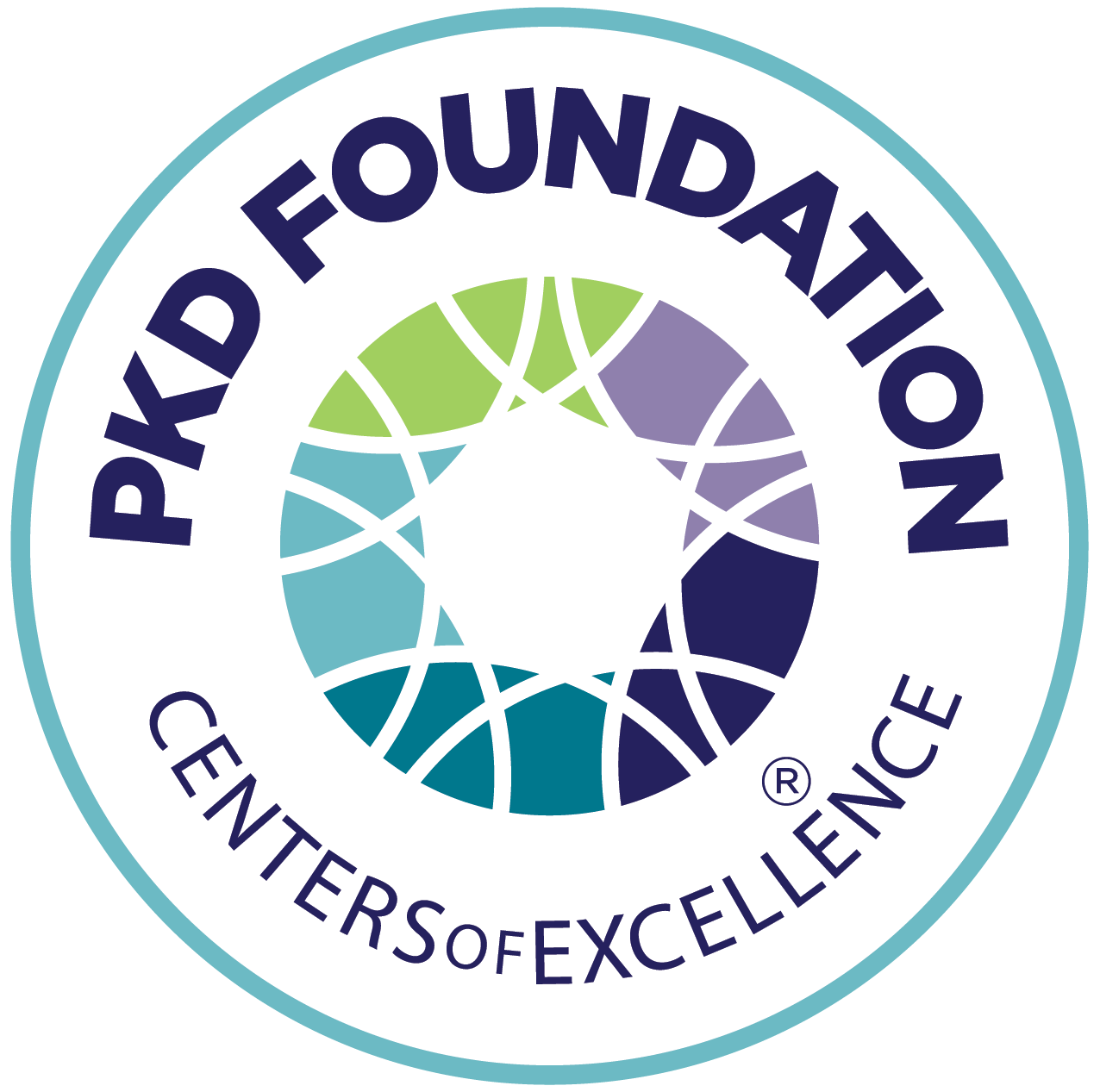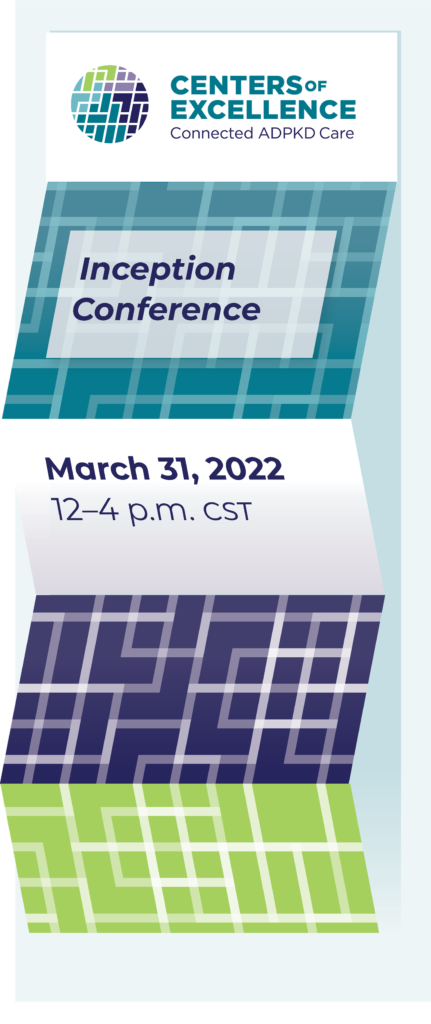
Clinic Designation
2024 Request for Applications
DEADLINE: AUGUST 28
Overview of program goals and scope
The ADPKD Centers of Excellence program is built upon the belief that the best way to provide ADPKD-centered care is through patient-focused, comprehensive care with the coordination and support of an integrated care team guided by patient navigation services. The program’s mission stands on three pillars: understanding PKD through research, ensuring better care for all individuals with ADPKD, and educating and empowering the community.
Under this RFA, the PKD Foundation solicits clinic applications to be designated as either an ADPKD Center of Excellence, Partner Clinic, or Pediatric Clinic.
Application Review Procedures
The PKD Foundation strives to be transparent related to our decision-making processes. We rely on our COE Advisory Group made up of clinicians and patient stakeholders, who develop recommendations for both designation and funding, as well as the processes we use as a Foundation to make funding decisions.
Important dates
Program Applications
Application Deadline: August 28, 2024
Review Period: October- September 2024
Applicant Notification: November 2024
Annual Progress Reports
Opens: December 1, 2024
Report Deadline: January 31, 2025
Email research@pkdcure.org with questions.
Care team and services
ADPKD Centers of Excellence provide comprehensive multidisciplinary clinical service for families affected by ADPKD in the United States. Services are centered around an organized ADPKD clinic in which an individual’s clinical care needs are defined, plans are made to fulfill those needs, and follow-up is provided to continually optimize clinical management.
Core clinic personnel must have established and demonstrated expertise in caring for an adult person with ADPKD. Depending on the level of services offered, ADPKD Centers will be categorized as Centers of Excellence or Partner Clinics. Clinics specialized in the management of pediatric ADPKD will also be designated as Pediatric Clinics.
COE Care Team Expectations
A Center of Excellence will offer comprehensive diagnostic and therapeutic services with identified staff responsible for most services in each of the following disciplines:
- Nephrology
- Radiology
- Hepatology
- Genetics
- Pain
- Patient navigator services
Non-core specialists that are preferred but not required include:
- Renal nutritionists/ dieticians
- Urologists
- Cardiologists
- Liver surgeons
- Neurosurgeons/ neurologists
- Obstetricians (high-risk pregnancy specialization)
- Psychologists/ Psychiatrists
- Social Workers
- Transplant surgeons
Core personnel at a Partner Clinic or Pediatric Clinic will include, at a minimum, a nephrologist interested in specialized management of ADPKD.
In addition, Clinics in the ADPKD COE program will be required to participate in the following:
- Mentorship networks between clinicians requesting peer-to-peer support at local institutions
- Participation in PKDF educational initiatives and quarterly webinars
- Collaboration with the local ADPKD community, including educational and advocacy initiatives and dissemination of information about ADPKD and PKDF
- Patient Advisory Panel: to be recruited by the clinic and must include representatives from the ADPKD patient community. The panel should meet at least once a year to discuss feedback on care services, as well as collaboration on community-facing education and advocacy initiatives
Major COE Requirements
- Multiple experienced ADPKD nephrologists (Nurse Practitioners, Physicians Assistants, and Advanced Practice Providers may also be considered)
- Trained in tolvaptan Risk Evaluation and Mitigation Strategy (REMS) program with experience managing patients on the therapy
- Access to core care team members onsite/on campus as listed above in “COE Care Team Expectations”
- Workflow in place for measurement of total kidney volume by institutional radiology provider(s)
- Participation in clinical research for ADPKD
Minor COE Requirements
COEs must meet a subset of at least three of the following:
- Access to at least four of the non-core specialists as listed above in “COE Care Team Expectations”
- Dedicated ADPKD clinic time at least once per month
- Existing patient navigator services
- Affiliated transplant center
- Available advanced CKD clinic and workflow to dialysis center referral (peritoneal dialysis, hemodialysis, and home hemodialysis)
- Current (or recent) interactions with the patient community through PKDF (e.g., served as faculty for a webinar or patient education session, hosted a booth at a local Walk for PKD)
Progress Reports
Designation as an ADPKD Center of Excellence or Partner Clinic is valid for three years. Designation as a Pediatric Clinic is valid for one year. Clinics do not have to re-apply each year unless changes occur in their Clinic Director or other relevant members of the care team. To maintain designation, current Clinics must complete an annual progress report to PKDF by February 1, 2024.
In any year in which an unsatisfactory Progress Report is submitted or upon failure to deliver the services or adhere to the terms and conditions delineated in the letter of designation, PKDF reserves the right to suspend the Center of Excellence designation and any applicable grant funding until such time as identified deficiencies have been satisfactorily addressed. Said deficiencies must be resolved within 120 days of suspension or the ADPKD Center of Excellence designation will be revoked.
View the 2022 Centers of Excellence Inception Conference

Application instructions
As an applicant for the ADPKD COE program, you’ll be asked to create a Proposal Central account. This helps us to track your application progress and best manage conflicts for our review process. Please upload this completed form as well as any relevant documents (e.g., CVs/resumes) to your application in the portal.
Clinics must be based in the United States in order to apply.
Multi-site practices will need to apply for designation unique to each location. Designations cannot be combined over multiple locations.
Center of Excellence
- Clinic general information
- Patients — Including current patient census, population demographic and health equity initiatives.
- Clinic Care Services — Including typical patient wait time for an appointment and follow-up experience, care team members.
- ADPKD Expertise: justification of ADPKD-specific knowledge for key personnel.
- Patient Navigator Services — an acknowledgement of role responsibilities and expectations.
- Pediatric ADPKD Patients — a description of applicable pediatric clinics or pediatric-to-adult care transition practices.
- Research — listings of all current, previous (in the past five years), or anticipated participation in clinical research (both industry-sponsored and investigator-initiated).
Partner Clinic
- Clinic general information
- Patients — Including current patient census and population demographics.
- Clinic Care Services — Including typical patient wait time for an appointment and follow-up experience, care team members.
- ADPKD Expertise: justification of ADPKD-specific knowledge for key personnel.
- Research — listings of all current participation in clinical research (both industry-sponsored and investigator-initiated).
Pediatric Clinic
- Clinic general information
- Patients — Including current patient census and population demographics.
- Clinic Care Services — Including typical patient wait time for an appointment and follow-up experience, care team members.
- ADPKD Expertise: justification of pediatric ADPKD-specific knowledge for key personnel.
- Pediatric-to-Adult Care Transition: details of the clinics relationship with adult specialists and transition processes.
- Research — listings of all current participation in clinical research (both industry-sponsored and investigator-initiated).
Page last updated April 2024







